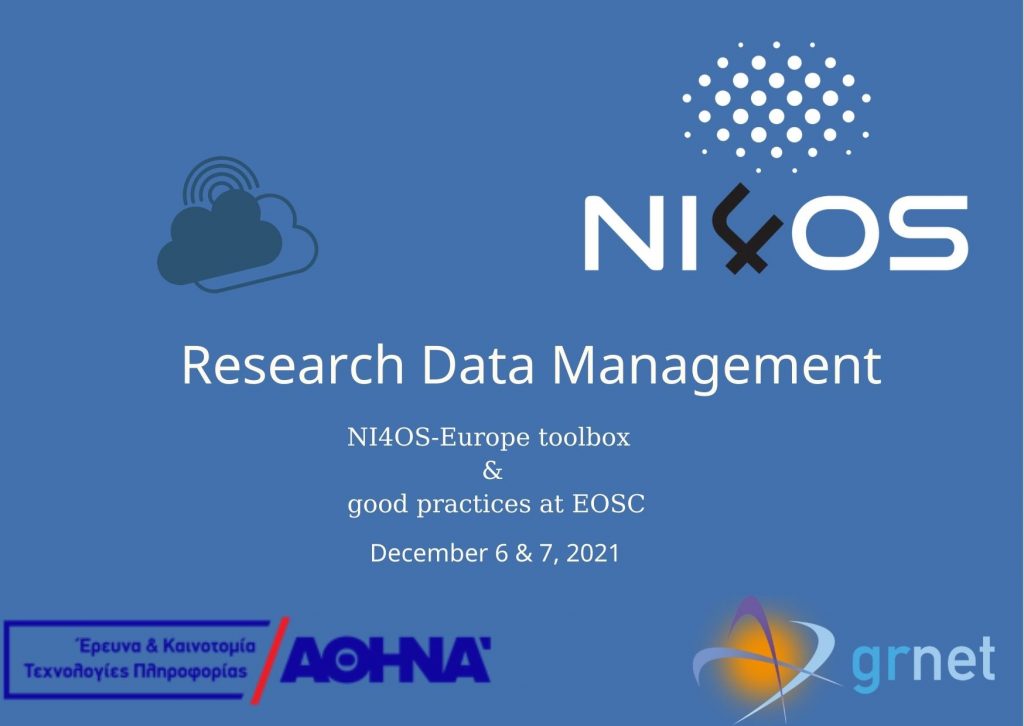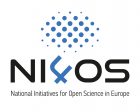
The NI4OS-Europe project has a main objective to support the research community by providing them with a catalogue of services, methods, and techniques to manage FAIR research data and align Open Science and Research Data Management (RDM) practices with EOSC and EC policy guidelines. Although RDM is a well-known concept to all researchers, they experience difficulties in applying Open and FAIR principles to their scientific fields and everyday workflows. The reason is twofold: the lack of good practice awareness at the level of individual researchers and the different level of RDM maturity among research domains and countries.
In December 2021, the Greek research community had the opportunity to virtually attend the two-day NI4OS-Europe training event that focused on bringing clarity and raising capacity on Open Science, FAIR Research Data Management, and the EOSC. The event was organized by Athena RC in collaboration with GRNET, and was supported by the OpenAIRE Greek NOAD. The event featured both local trainers and external speakers, so the sessions were presented in Greek and English as well. The training combined theory and practice as well as promoted discussion between trainers and trainees.
The first day started with a theoretical approach to briefly introduce the NI4OS-Europe project’s latest activities and the EOSC governance and structure. Then, the day was dedicated to “ORDM basics” explaining the RDM Lifecycles step-by-step: from data planning and creation to data processing, preservation, data access and re-use. Trainees were informed about Open and FAIR best practices and had the opportunity to apply them following small interactive assignments/exercises.


The “ORDM basics” session revealed the necessity to start planning RDM activities from the early stages to ensure data reuse and achieve cost-effectiveness. The day ended with more technical presentations covering the process of onboarding services to the NI4OS-Europe catalogue as well as presenting a case study from biomedicine about “Extracting correlations for patient stratification using machine learning. Trainees discovered AGORA, which is the NI4OS-Europe Resource Portfolio Management service and were informed about the steps required to onboard their services to NI4OS-Europe catalogue. The use case included an evaluation of the onboarding process which showed that candidate services require minor fixing or development of flawed operations to become fully on-boarded on NI4OS-Europe.
On the second day, sessions focused on the legal aspects of data management and reuse for better and quality research data, and demonstrated tools to facilitate FAIR policies and legal uncertainty. The first presentation provided the background in terms of current legislation indicating that the field of law is a continuous and fast-evolving environment where Greece is bound to comply and adapt to in Europe (GDPR Directive, Copyright Law etc.). In this context, researchers are concerned with overcoming issues related to Intellectual Property Rights (IPR) while service providers are called to follow specific standards and write policies for their data services. The day progressed with a live demonstration and exercises of NI4OS-Europe and OpenAIRE tools for RDM policies and plans.
The NI4OS-Europe RDM training in Greece was well perceived by the community who engaged in different types of activities to practice what learnt during each session. From the Q&A sessions, it became apparent that RDM is not a costless activity and infrastructure and services even training and skills require resources. Trainees communicated the need to be supported by service providers for interoperability and findability of their data.
What participants learned
- To integrate Open Science and Research Data Management (RDM) practices in their everyday work
- To use new tools to comply with EC funding requirements and EOSC Rules of Participation
- To have a better undertaking of the legal elements pertaining to Open Science and RDM
- To have answers for their Open Science endeavors
- To be familiarized with the NI4OS-Europe catalogue and the EOSC services
Links
